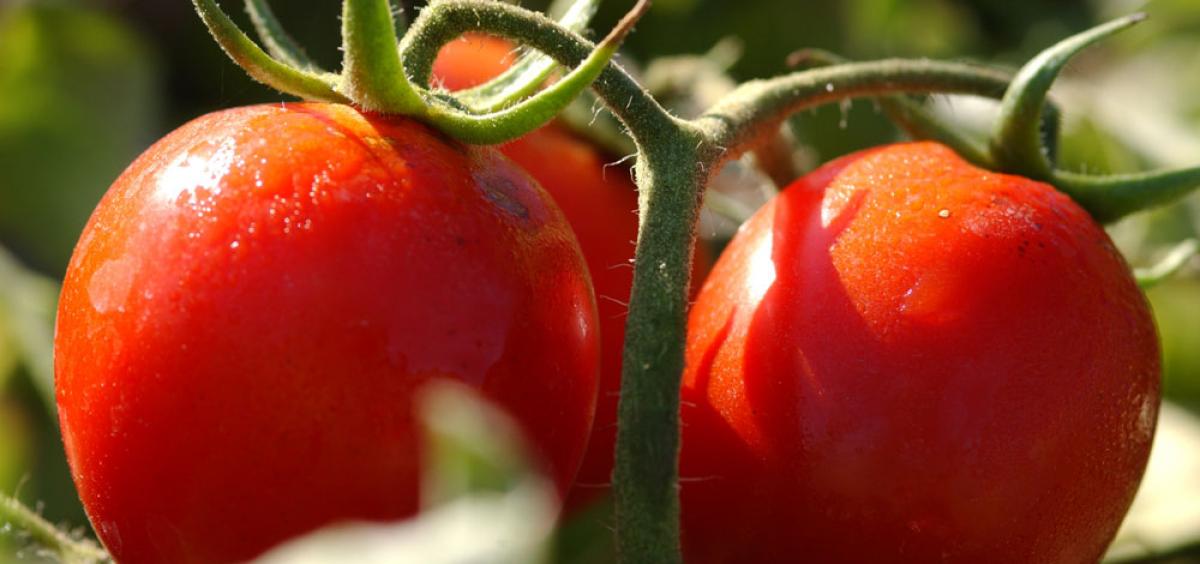
CORVALLIS, Ore. – Growing vegetables without irrigation may sound farfetched, but two Willamette Valley trials proved crops can be grown in home gardens without a drop of irrigation.
At demonstration gardens in Benton and Marion counties, Oregon State University Extension Service Master Gardeners successfully grew tomatoes and other vegetables without irrigation except on the day they put them in the ground. The idea came from Amy Garrett, assistant professor of practice with the Extension Small Farms Program, who is conducting research into dryland farming, an ages-old but little-used method of farming vegetables without supplemental irrigation.
Garrett began her research in 2015 with a trial of tomatoes, squash, beans, and melons. Not only did the plants thrive, but in a blind taste test the majority choose dryland tomatoes and melons over irrigated ones. The taste, they said, was sweeter.
Since Garrett started her work on dryland farming the idea caught on and the Dry Farming Collaborative has formed to further refine the system. The idea intrigues home gardeners, too.
When some OSU Extension Master Gardeners found out about Garrett’s research, they decided to translate the principles to small-scale plots. In Benton County, Ann Brodie headed up a group that grew three ‘Dirty Girl’ tomato plants for two years at their demonstration garden at the Benton County Fairgrounds.
“They all did very well,” said Brodie, who has been a Master Gardener for 18 years. “We got lots of tomatoes; they were really productive and they tasted great. The only thing we noticed was that the skin was a little tougher.”
The tomatoes were planted deeply with an organic fertilizer and dash of water and mulched with straw. After that, they were on their own. No irrigation. Period. She has to say that over and over again, because people find it hard to believe. However, more proof came from a trial undertaken by the Marion County Master Gardeners, who had similar success. Bill and Carol Sutkus, Master Gardeners since 2012, managed a project that featured ‘Early Girl’ tomatoes, ‘Dark Star’ and ‘Costa Romanesco’ zucchini, and ‘Zeppelin’ winter squash.
The crops were tested in three ways with three tomatoes in each planting: one group was irrigated; one was mulched with grass clippings and not irrigated; and one was not irrigated.
Again, the results were positive for the non-irrigated vegetables. In a blind taste test, the tomatoes grown without irrigation under mulch won. The second year of the trial, the Sutkuses planted grafted and non-grafted ‘Stupice’ and ‘Early Girl’ tomatoes. In a taste test, the non-irrigated, non-grafted ‘Stupice’ won.
Their takeaway? Plant with a mulch. Straw, compost, wood chips, bark dust, fabric or plastic would work if grass clippings aren’t available. Don’t water.
The caveat is what type of soil you have. To have a dryland garden, you need deep soil with good water-holding characteristics. Gardening without irrigation works in suitable soils because many vegetables, especially those with long roots like tomatoes and melons, can use the residual water from the wet season to supply moisture during our dry season. Whether it would work outside of the Willamette Valley depends.
“There is not a precise recipe,” Garret said, “so I cannot say who can and cannot dry garden, although dry farming vegetables in areas with less than 20 inches of annual rainfall would be much more challenging than it is for gardeners in the Willamette Valley where we get 40 inches. In these drier areas, the same practices might be used to reduce irrigation rather than use none at all.”
Both gardens are continuing their trials. The gardens are open to the public and Master Gardeners are often there to answer questions. Or contact the Master Gardeners in Benton and Marion counties by phone, email or in person to get information and advice. You’ll also find a lot of information geared toward farming but useful for home gardeners on the Dry Farming Collaboration’s Facebook page.
“It works,” Brodie said. “It’s possible to have a garden without watering or very little and have a productive garden. It’s an important technique when you’re trying to save resources, and water is one of the biggest issues.”
Here are some tips from Amy Garrett on how to get started:
About the OSU Extension Service: The Oregon State University Extension Service shares research-based knowledge with people and communities in Oregon’s 36 counties. OSU Extension addresses issues that matter to urban and rural Oregonians. OSU Extension’s partnerships and programs contribute to a healthy, prosperous and sustainable future for Oregon.
Kym Pokorny, 541-737-3380, kym.pokorny@oregonstate.edu
Amy Garrett, 541-713-5007, amy.garrett@oregonstate.edu
Click photos to see a full-size version. Right click and save image to download.